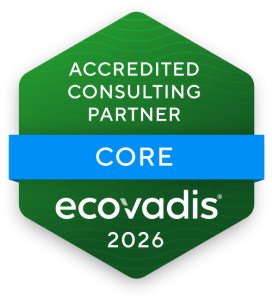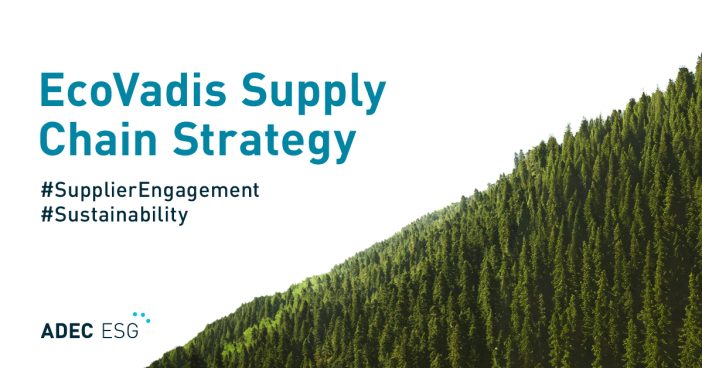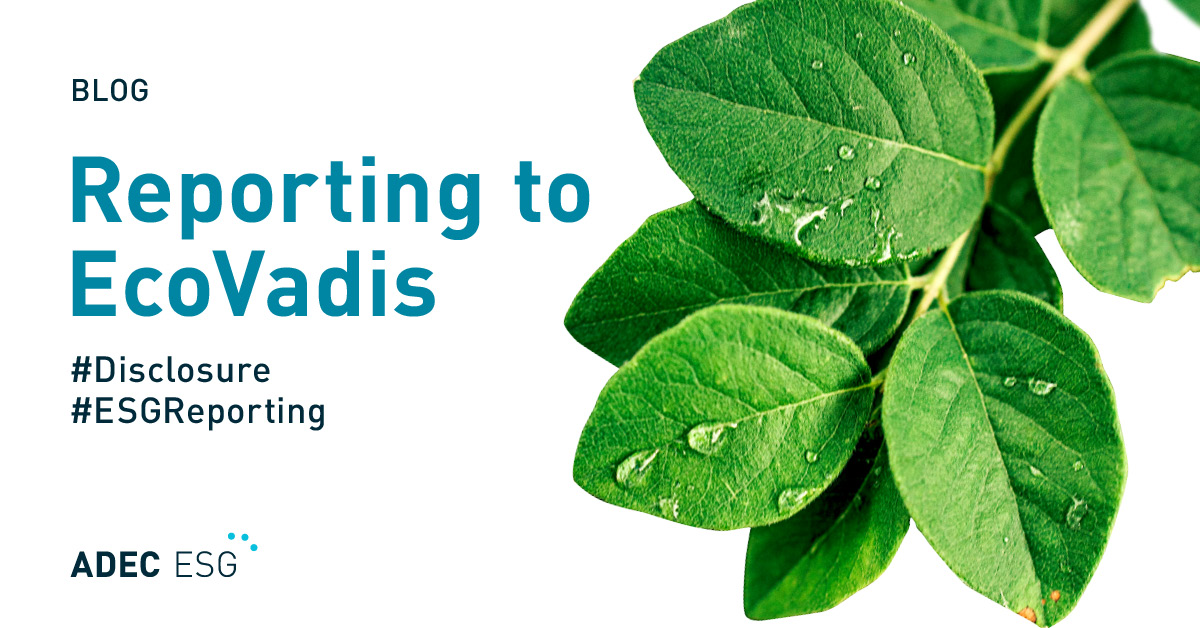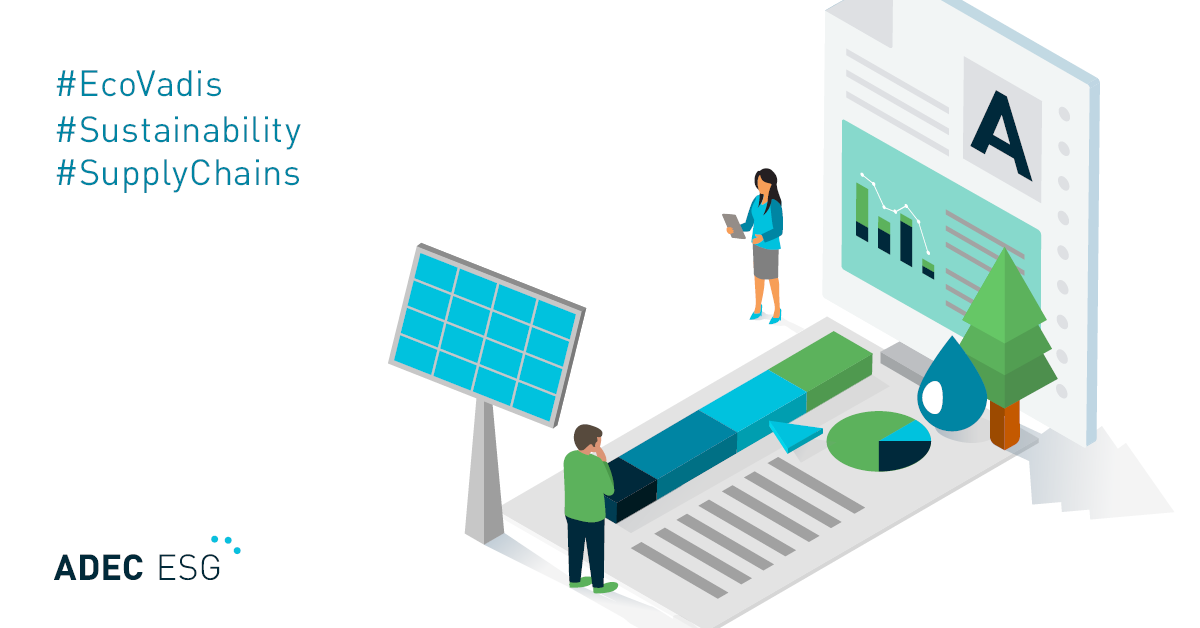In previous articles, we discussed how to disclose to EcoVadis and the broad role that EcoVadis plays in supply chain sustainability.
Today, we’re focusing on the EcoVadis requester role, speaking to specific tactics you can use to elevate your supply chain strategy and answering questions like:
- What steps can we take to integrate EcoVadis into our supplier engagement programs?
- How can EcoVadis help us meet supply chain sustainability targets?
- What tools are available within EcoVadis to help our suppliers?
Make it official
EcoVadis is a cloud-based sustainability reporting software that helps more than 1,400 global organizations assess and monitor their increasingly complex supply chains worldwide. For suppliers, participation in EcoVadis’ program provides numerous benefits, including insight into operational sustainability, benchmarking and progress tracking, and greater transparency and credibility. With over 150,000 supplier companies already rated by EcoVadis and growing numbers every year, chances are high that if your organization hasn’t been asked to participate yet, it soon will be.
That said, for many suppliers, EcoVadis disclosure may only seem like an unwanted, added cost—especially in the face of existing customer requests for information as well as new mandatory reporting requirements like those coming into effect in the EU (e.g., the Corporate Sustainability Reporting Directive). Additional reporting adds what feels like duplicative cost, time, and effort—with little added benefit.
Take time to explain EcoVadis to suppliers who are unfamiliar with or hesitant about participation, and take steps to thoughtfully integrate reporting into your governance policies. Consider:
- Communicating why you have chosen to use EcoVadis and how it aligns with company-wide sustainability targets and goals
- Setting expectations early and make EcoVadis participation a part of your supplier onboarding or renewal process
- Emphasizing that it isn’t just a compliance tool—it’s a collaborative platform for continuous improvement and a way for participants to come together to work towards a common goal
- Clearly outlining how scores will be used in performance evaluations or sourcing decisions
- Codifying disclosure requirements into supplier contracts, procurement policies, risk evaluation frameworks, performance reviews, RFPs, or supplier codes of conduct
- Giving suppliers a voice and venue for collaboration by creating a supplier sustainability council or hosting regular supplier roundtables focused on shared challenges and the co-development of strategic solutions
- Tying EcoVadis reporting to other goal-setting programs such as the Science Based Targets initiative
Provide resources and support for new suppliers
Thankfully, suppliers new to EcoVadis—or looking to improve—have a wealth of resources available to them. Share these guides, recommendations, and tutorials with suppliers to provide them with a jumping-off point:
- EcoVadis Learning Academy: EcoVadis provides a number of learning modules through the EcoVadis Academy, designed to help disclosing companies learn and improve. Course topics span the four sustainability themes and include topics like responsible sourcing, awareness training, ethics policies, risk analyses, biodiversity management, and information security.
- EcoVadis Accredited Partners: Connecting suppliers with EcoVadis-approved training partners allows you to directly engage and support your participating supply chain members. Accredited partners host workshops and webinars that walk suppliers through the EcoVadis assessment process, offer tips on how to improve, and can work directly with individual suppliers to help improve their performance. As an EcoVadis Accredited Core Partner, ADEC ESG provides both education and direct support to suppliers responding to EcoVadis’ assessment—talk to our team to learn more.
Engage suppliers on improving performance
Reporting platforms like EcoVadis can help foster positive relationships with suppliers. Actively engaging with your supply chain on their progress and providing them with resources to help them succeed also play a key role in helping you achieve your targets.
- Celebrate success: Recognize suppliers who achieve high scores or show improvement. EcoVadis helps facilitate this by awarding high scorers and fast-movers with badges and medals.
- Offer support: For suppliers working to improve, offer feedback and resources to help them improve their sustainability practices. Previously mentioned resources such as the EcoVadis Academy and Accredited Core Partner workshops can serve as valuable tools for education, capacity building, and targeted action planning. Check out this case study to learn more about how we helped a U.S. chemicals company improve its score and bridge gaps in its policies and processes.
- Utilize Scorecards and Corrective Action Reports: Direct feedback from EcoVadis, such as Scorecards and Corrective Action Plans (CAPs), can help suppliers identify the widest or most common gaps. Focused workshops and training can then be implemented to educate and address these items. Use results to work together with suppliers for continuous improvement.
Leverage EcoVadis for other forms of disclosure
The holistic nature of sustainability reporting means that participation in programs like EcoVadis can have wide-reaching effects across your organization, and results can be leveraged for greater progress on your broader sustainability goals—beyond just improving EcoVadis scores.
For suppliers, EcoVadis customizes its assessment to each responding organization, incorporating questions and topics that are most material to a company based on its industry, size, and scope. This means that scorecards can be used to identify potential gaps in your policies, actions, and key performance indicators (KPIs), helping improve your sustainability program overall. Implementing these improvements will also support other forms of reporting—such as CSRD, CDP, S&P Corporate Sustainability Assessment (CSA), and more.
For requesters, EcoVadis results can also be included in other forms of reporting to demonstrate progress on goals, how you’re engaging with suppliers, and overall improvements in resilience. Consider including your EcoVadis participation in:
- Annual sustainability reports
- CDP value chain engagement modules
- Science Based Targets initiative reporting (supplier engagement targets)
- Announcements, press releases, and other company communications
As a thematically structured framework, EcoVadis can serve as a blueprint or roadmap for evolving your sustainability program and those of your suppliers. In turn, your suppliers can also use their EcoVadis results to engage their own upstream partners, creating a ripple effect of improvement throughout the value chain.
As sustainability regulations evolve and stakeholder expectations rise, EcoVadis offers a scalable, data-driven approach to supplier management that aligns with your long-term goals and helps your build a more resilient supply chain. By integrating EcoVadis into supplier engagement and broader sustainability disclosures, you create a consistent framework for accountability, transparency, and continuous improvement—for both yourself and your suppliers. As a requester at the helm of your group of suppliers, EcoVadis gives you the tools to drive meaningful change.

As an EcoVadis Accredited Core Partner, ADEC ESG supports both requesters and responders, with years of expertise in sustainability disclosure and reporting, metrics management, and program development. Talk to our team to learn more about how we can help, no matter where you are on your sustainability journey. Ask us about:
- Customized supplier engagement workshops
- KPI and target development
- Policy development
- Document management
- Gap analysis
- Full EcoVadis assessment completion
- Customizable on-demand services
This blog provides general information and does not constitute the rendering of legal, economic, business, or other professional services or advice. Consult with your advisors regarding the applicability of this content to your specific circumstances.



